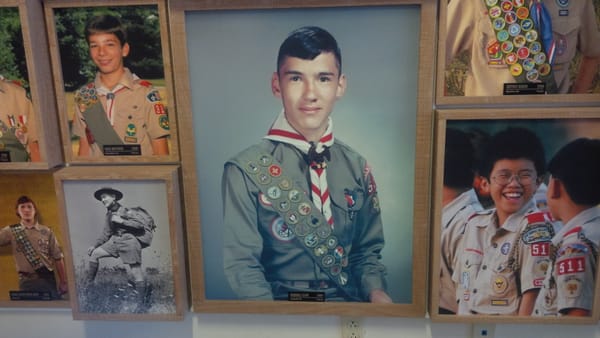At summer camp, politics and inclusion are on the table
How BSA units are navigating a fraught cultural landscape to find camp environments that work for them.

Mike Ryan Simonovich’s Scouts BSA troop has often ventured outside of its home state of Florida for summer camp, in an effort to escape the “sand and skeeters” of the local council camp.
Normally they’ll drive out to Georgia or North Carolina, as far north as they can get in a one-day drive. “Practically speaking, we’re not gonna leave the South,” he said.
But now, the troop where Ryan Simonovich is an adult volunteer has another consideration in deciding where to camp: politics. With close to 500 anti-LGBTQ bills proposed across the country so far in 2023, Ryan Simonovich has started to think about how his youth-led troop might factor in these state-level politics when choosing a summer camp.
“I’m a believer in democracy, but also I’m a big believer in voting with your wallet. And I think that you support organizations you believe in, and you don’t want to support organizations you don’t believe in,” he explained.
For this year, it’s too late: The youth in the troop have already committed to a camp in Tennessee, and made that decision long before that state distinguished itself this year for its anti-LGBTQ legislation.
But in a troop that has many LGBTQ+ youth and allies, Ryan Simonovich figured the scouts might want to make a different decision next year. “A big part of Scouting is citizenship and civic engagement,” he said, “and so that's sort of what drove this question.”
He’s not suggesting politics be the only consideration in camp selection, but that it should be weighed right alongside logistical considerations and the quality of the camp itself. Being based in Florida—a state itself notorious for its “Don’t Say Gay” bill—doesn’t make that easy.
“Everything within a one-day [driving distance] of here looks bad,” Ryan Simonovich said, referring to the map of anti-LGBTQ laws proposed in each state.
So he recently took to Facebook to get some advice on this dilemma.
Taking it camp by camp
The comments that poured in on Ryan Simonovich’s post quickly made one thing clear: State-level politics need not be destiny.
One of the scouters who weighed in was Teri Bailey Craighead. “We're in … Missouri, so more than a day’s drive obviously, but if you can ever make it to Camp Arrowhead … you'd be more than welcome,” she wrote. “We have a very diverse staff, with many LGBTQ on staff. One of my sons is now 18 and this will be his fourth year on staff, and he's never had a problem of any sort with being accepted for who he is.”
I was intrigued, so I called up Bailey Craighead and her son, John Thomas Craighead, to learn more about this camp.
Despite being located in Missouri—another state leading the nation in anti-LGBTQ legislation—John and Teri told me that Camp Arrowhead stands out for its inclusive environment. John cited the many openly LGBTQ+ staffers, including himself, as well as a pride flags waving at the pool area, where the recent aquatics director was a trans woman.
“It’s just been pretty good, overall,” John said.
His mom Teri (who also works on staff at the trading post) praised the camp’s mandatory inclusion training, and leadership’s commitment to maintaining a welcoming culture. “They don’t tolerate anything, not at all,” she said, referring to nasty jokes or hateful comments.
Teri also told me how, the first year John attended camp as an openly gay teen before he was on staff, she reached out to the camp director to make sure he’d be accepted. “They went out of their way to make sure that everyone would feel as comfortable as they could be,” Teri said, even granting John special permission to use private shower stalls.
But at the end of the day, issues of politics and LGBTQ+ inclusion don’t really come up all that much at camp, John says. He has a sense that a good number of the youth he encounters each summer are LGBTQ, but it’s not something he brings up. “I’m just teaching basketry,” he says.
‘Make sure you go and check things out’
The Craigheads were not the only scouters I would end up talking to about summer camps in Missouri.
I also interviewed Chip Sitzman, an adult leader in Kansas City, Kansas, whose three kids are all involved in Scouting. He told me about two very different experiences he had at two camps in Missouri—illustrating how camp culture has a lot less to do with state politics, and a lot more to do with council leadership.
Sitzman had a keen interest in issues of inclusion from early on. He helped start a trio of Scouting units—a Cub pack and two linked troops—shortly after the program opened its ranks to girls. “We really supported the idea of family scouting, inclusive scouting, and really hit on that,” he said.
The units quickly attracted many LGBTQ+ scouts, including Sitzman’s own children, one of whom is nonbinary and one of whom is trans. Being new troops, they also had to decide on a summer camp to attend.
Sitzman had previous experience with a camp in the southwest part of Missouri. But he was not inclined to bring his new linked troops there. For one thing, he found the shower and bathroom facilities to be lacking, especially the gang shower setup. Plus, he said the camp leadership hadn’t laid out a clear plan for integrating girls into the camp culture.
So he looked instead toward Camp Geiger, north of Kansas City in Missouri, where the vibe could not have been more different. Sitzman said that camp leadership had a clear strategy for welcoming girls, and dedicated two of the six summer sessions specifically for linked troops. That would allow the boy and girl troops to share a campsite, too. “That was attractive to us,” Sitzman said.
He was also wooed by the updated facilities at the camp. Each site had a storm shelter with private flush toilets and shower stalls, something he considered essential for the LGBTQ scouts. “You do have a different amount of privacy there,” Sitzman said. “That was a pretty critical factor.”
The troops have now attended summer camp at Geiger for three years, and it has quickly become a favorite among the scouts.
Sitzman’s advice to other troops trying to find the right camp is simple: “Make sure you go and check things out, actually go there, talk to some people there.” When he spent time with the camp director in southwest Missouri, he immediately knew it wasn’t the right fit. “They made some things very clear … girls were seen as a distraction to boys,” Sitzman said. “Their intention was to keep everybody separate.”
“When we went to Camp Geiger, it was the exact opposite,” he continued. The camp director was intent on making sure everyone felt welcomed. “His question every day is, ‘What we can do to help you?’ So a much different attitude there.”
Key Takeaways:
- Decisions on summer camp should be youth-led. Allow them to weigh different factors—including, if they want, politics and inclusion—when deciding where to enroll.
- State-level politics don’t necessarily translate to camp cultures. Even in states notorious for anti-LGBTQ legislation, you may find individual camps that are accepting.
- Do your due diligence to vet a camp before attending for the first time. Talk to council and camp leadership to gauge their commitment to inclusion.


